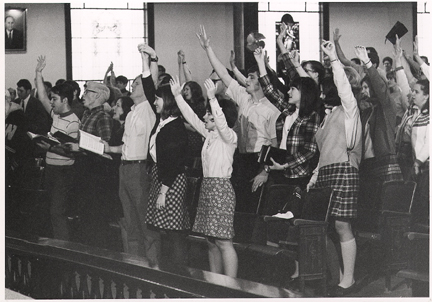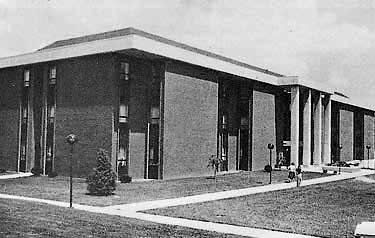History: 1970-1979
1970
Z.T. Johnson, retired President of Asbury College, became mayor of Wilmore on Jan. 1.
 On Feb. 3 Dean Custer B. Reynolds, scheduled to speak in chapel, felt led to invite persons to give personal testimony instead. Many on campus had been praying for spiritual renewal and were now in an expectant mood. Soon there was a large group waiting in line to speak. A spirit of powerful revival came upon the congregation. The chapel was filled with rejoicing people. Classes were cancelled for a week, but even after classes resumed on Feb. 10 Hughes Auditorium was left open for prayer and testimony. These sessions were presided over by Reynolds, Clarence Hunter and other faculty.
On Feb. 3 Dean Custer B. Reynolds, scheduled to speak in chapel, felt led to invite persons to give personal testimony instead. Many on campus had been praying for spiritual renewal and were now in an expectant mood. Soon there was a large group waiting in line to speak. A spirit of powerful revival came upon the congregation. The chapel was filled with rejoicing people. Classes were cancelled for a week, but even after classes resumed on Feb. 10 Hughes Auditorium was left open for prayer and testimony. These sessions were presided over by Reynolds, Clarence Hunter and other faculty.
In May the first Ichthus Christian rock festival was held in Wilmore.
Alan Moulton became dean of student affairs. Harold Spann became assistant to the president.
The “Dine-a-Mite” student snack shop was demolished during the summer. A faculty parking lot was built on the site.
William Eddy became director of admissions and financial aid.
1971
On June 30 the 26 Amendment to the U.S. Constitution was ratified, making 18 the national age for voting rights.
On Oct. 26-27 the Francis Asbury Convocation was held on campus to commemorate the arrival of Bishop Francis Asbury to America two hundred years before.
1972
Joseph Thacker became mayor of Wilmore on March 31.
In April the Board appointed a “Special Institutional Self Study Committee” of trustees, chaired by C.R. Hager. The committee was to conduct a detailed survey of the entire program as a guide to future planning. Kinlaw regarded the final report as invaluable.
Harry Greenberg became assistant to the president for business affairs.
Leslie Ann Gray, a Wilmore resident, graduated in August with a degree in Sociology—the first American Black graduate of the College.
In October the Board Room in the Administration Building was named “The E. Stanley Jones-J. Waskom Pickett Board Room,” in honor of two famous graduate missionaries to India.
In November Richard M. Nixon was re-elected as President.
The first public demonstration of the Internet was in this year.
1973

The Dorothy M. Kresge Residence Hall was opened. At a cost of $1,754,000, this was the largest capital project in College history to date. The Stanley Kresge Foundation was a major donor.
Roger Kusche became dean of academic affairs.
Also in 1973 the Wilmore City Hall moved to 335 E. Main Street, its present location (2003).
1974
The small dining room in the college dining hall was refurbished. In October it was named in honor of retired board member Wilbert H. Dougherty.
Richard M. Nixon resigned as President and was succeeded by Vice-President Gerald Ford.
Dr. Phyllis Corbitt became the College physician in the fall.
1975
A joint committee of the College and seminary met to decide the future of the Herald, but proved fruitless. The venerable magazine became a seminary house organ.
The Faculty Research and Development Committee was created. It recommended, among other things, more College funding for professional memberships, study travel and sabbaticals.
In April Saigon fell to North Vietnamese military forces, effectively ending the Vietnam War.
In October the new city sewer system was completed.
In the fall the Salvation Army Student Fellowship was reorganized under the auspices of the Army’s National Headquarters. This was the Army’s only national organization for its college students. Lt. Colonel David Moulton, a retired Salvation Army officer, was appointed national liaison and chaplain to the new group. An informal student center opened in the Moultons’ home in Wilmore. Salvationist faculty members Edward McKinley and James E. Curnow were commissioned as corps sergeant major and bandmaster.
1976
In March new hymnals were placed in Hughes Auditorium. The new Hymnal for the Living Church was the senior class gift.
Harold L. Rainwater became mayor of Wilmore on April 12.
The business management major was added.
The academic dean, Roger Kusche, was given additional executive powers, in order to give Kinlaw more time for travel, fund raising and public relations purposes. The new position of associate academic dean was created. The first incumbent was the registrar, Howard Barnett.
Asbury joined the Christian College Coalition.
In November James E. Carter, Democrat, was elected President.
1977
Construction on a transitional building, intended at first for use as a men’s residence hall, was begun.
In February Roger Swallows became chief of police of Wilmore.
The city purchased the water system from Asbury College.
1978
In March the science building was named for Cecil Hamann and Paul Ray. The new transitional building was named for Duvon C. and Roberta Day Corbitt.
Also in March Sollie McCreless retired from the Board. He was replaced as Chairman by George E. Luce, a successful bus manufacturer from Ft. Valley, Georgia. Luce and his brothers were prominent figures in holiness and missionary circles.
The Society of Christian Philosophers was founded.
In the fall Asbury’s music program was accredited by the National Association of Schools of Music (NSAM) and the social work program was licensed by the Council of Social Work Education (CSWE). The incoming freshman class adopted a distinctly religious-sounding class name—“Defenders”—and thereby unknowingly started a trend.
A slight drop in enrollment was recorded, reversing ten years of steady growth.
1979
“Dinner Seminars” for faculty began during Winter quarter.
The “Crusade for Excellence,” the most ambitious development crusade in College history was launched. Its official goal was to raise $12,000,000 for program, capital improvement and endowment over five years.
In February Asbury made it into Guinness Book of Records for the world’s longest recorded volleyball game marathon.
The total College budget for the academic year 1978-1979 was five times larger than that of ten years before. Fall enrollment (1245) was 32% higher than the previous decade.
Alan Moulton resigned as dean of student affairs and was replaced by Jay Dargan.
Harland Lutz was appointed first director of computer services.
On Dec. 6, Sollie E. and Lilla Marr McCreless donated $1,700,000 to the College, the largest single gift received in the history of the College to that date.